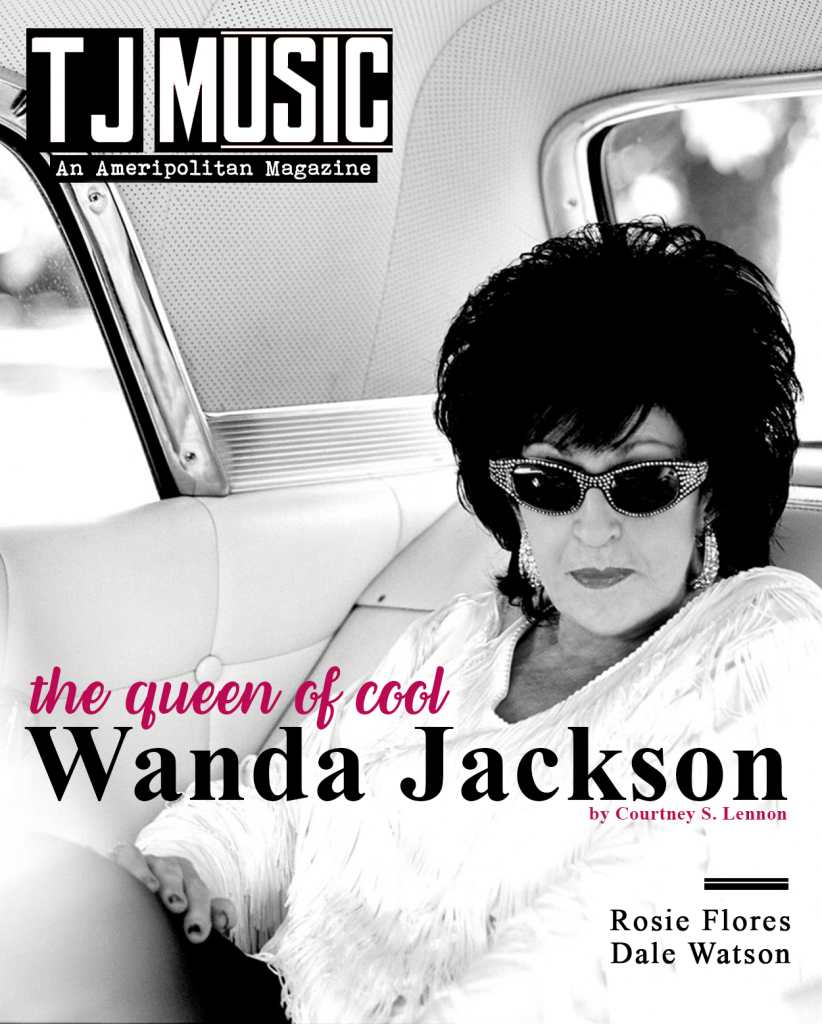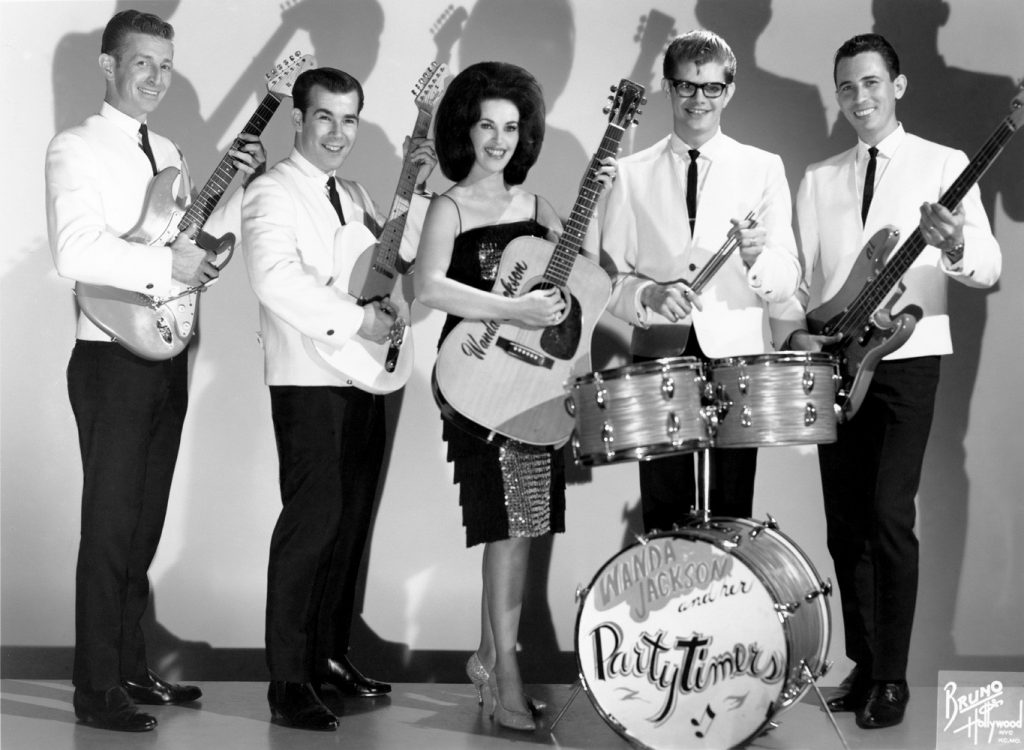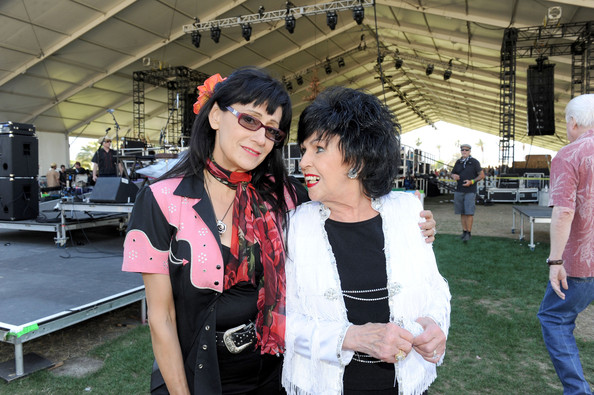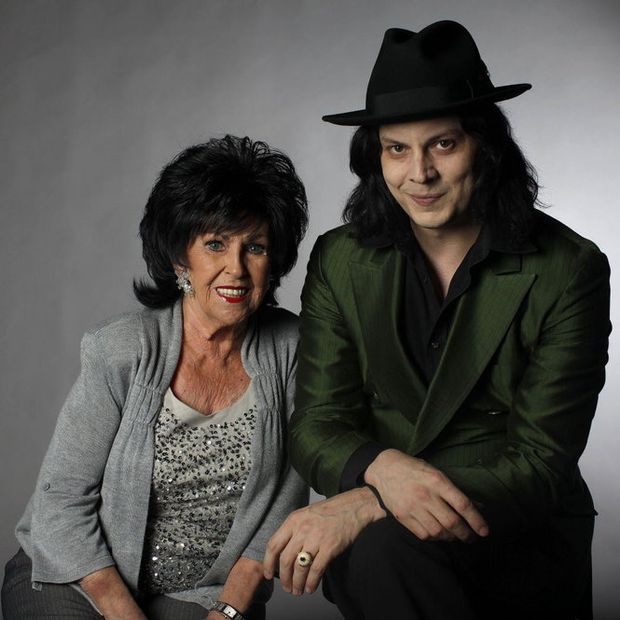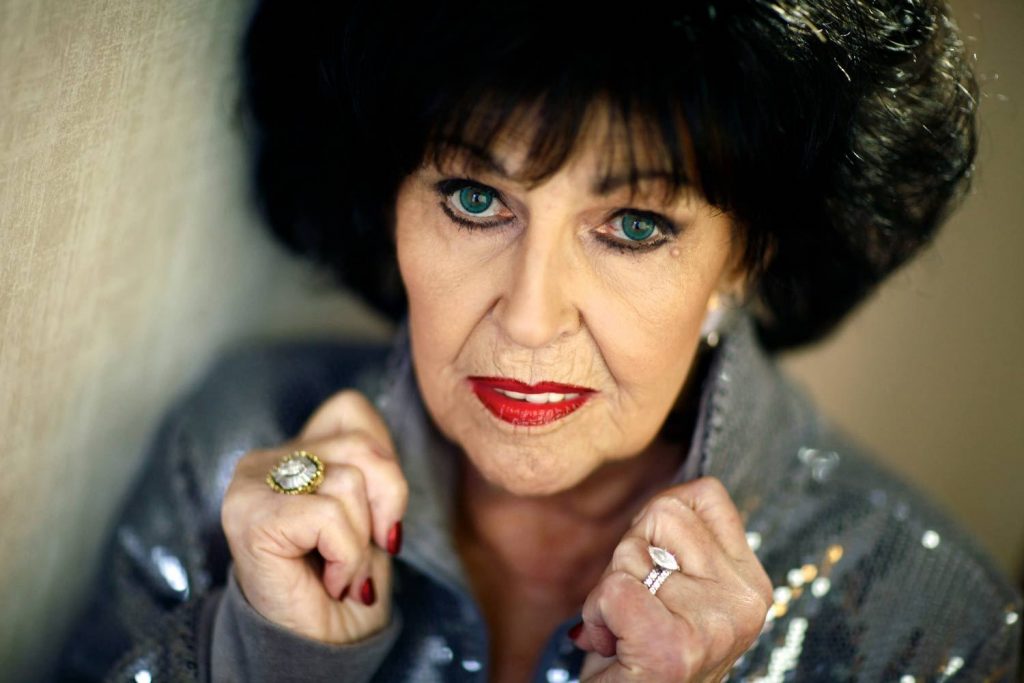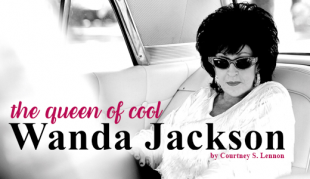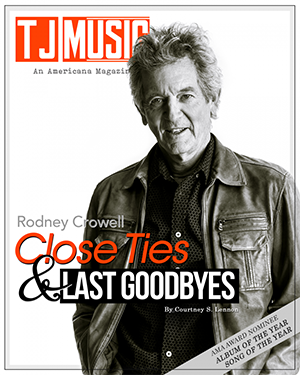It is mid-September, 2017. Wanda Jackson, The First Lady of Rockabilly, is at home in Oklahoma, the place of her birth and where she has spent almost her entire life. It is a beautiful, warm summer day, but it has been just a few short months since Jackson lost her beloved husband and manager, Wendell Goodman, who passed away on May 21, 2017. Jackson married Goodman in 1961. They were married for 56 years. Despite her career as a recording artist, they chose to raise their children in Oklahoma, outside of the music industry, so that they would always have family around. Jackson recounts her early relationship with Goodman.
“He was dating my best friend, Norma Jean [Beasler] at the time. She had a date with Wendell and she stopped by our house for me to meet her new boyfriend. So, I did. And golly, the minute I saw him, I fell for him. And I knew that I did and thought, ‘Gosh I’m in trouble, because my friend is dating him.’ But the lord took care of it for us and for her, when Porter Wagoner contacted her and offered her a spot with his band on his show. She was eager to do that, so she moved to Nashville. She told me to take good care of Wendell. So, in a few months, I called her and said, ‘You wanted me to take care of Wendell, and the only way I can really do that is to marry him.’ We were married eight months later.”
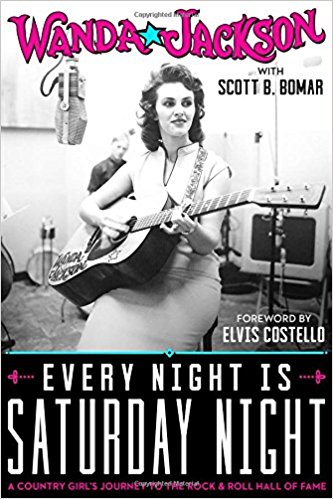 Back in September, Jackson was nearing the release of her autobiography, Every Night is Saturday Night, which she co-wrote with author Scott B. Bomar (The Bakersfield Sound: Buck Owens, Merle Haggard, and California Country). The book was released in November 2017. After a few failed attempts at writing her biography, she connected with Bomar through her granddaughter and now manager, Jordan Simpson, who lives in Nashville. Simpson knew that she was trying to put her life story out and the publishing company, BMG, showed interest.
Back in September, Jackson was nearing the release of her autobiography, Every Night is Saturday Night, which she co-wrote with author Scott B. Bomar (The Bakersfield Sound: Buck Owens, Merle Haggard, and California Country). The book was released in November 2017. After a few failed attempts at writing her biography, she connected with Bomar through her granddaughter and now manager, Jordan Simpson, who lives in Nashville. Simpson knew that she was trying to put her life story out and the publishing company, BMG, showed interest.
“That young man is so sharp,” she says of Bomar, “and so good at what he does. I was thrilled to death. I thought ‘This time it’s gonna work.’”
Jackson, who began her career as a country singer, found success at a young age. In 1954, at just 16, she had a top 10 hit with the song, “You Can’t Have My Love,” which made her more determined to pursue music. “All I ever wanted to do was to perform and sing,” she says. “So far, that’s all I have done. When I had that early hit, I was still in high school. I’ve never had a whole lot of self confidence, but it helped me believe a little bit more in myself.”
In 1956, Jackson began recording rockabilly music, with the release of “I Gotta Know,” a song that alternates between a country waltz and rockabilly. It reached no. 15 on the charts. Jackson’s other early songs include, “Mean, Mean Man,” “Hard Headed Woman” and “Fujiyama Mama,” which was a no. 1 hit in Japan. “[Playing rockabilly] came about by my touring with a boy named Elvis Presley,” she says. “He’s the one that convinced me that I should be recording this new kind of music that young people liked. Before, our songs were directed at adults. But he proved to everyone that the young people are actually the ones that make hit records, because they buy them. They had their own money by that time. They were the ones calling radio stations to hear the songs. So, when Elvis explained that to me, I kept saying, ‘But I’m just a country singer and besides that, I’m a girl. I can’t do that kind of music.’ But, he made me promise I’d try.”
Presley’s name is of course, often mentioned when speaking of Jackson. Early on they shared the bill on shows together as they became innovators of the rockabilly sound. But more often than not, she is asked about their relationship, which was romantic for only a brief moment in their lives. But beyond that, the revolutionary sound they developed from both a male and female perspective, is what most notably makes their names synonymous.
When speaking about Jackson, honky tonker and purveyor of roots music, Dale Watson, says it best. “She’s the female Elvis. She broke ground for women in the genre when it came along. It would be totally different for women playing rockabilly if it wasn’t for Wanda Jackson. The genre, it’s hard to think about without her. Connie Francis was instrumental as well. But Wanda’s always been street and raw.”
Pivotal and outspoken in his efforts to preserve and carry on the sound of artists such as Jackson, Watson presented her with the Ameripolitan Founder of the Sound Award at the Continental Club in Austin in 2015, alongside singer, Miss Celine Lee, as well Jackson’s friend, former touring partner and rockabilly revivalist, Rosie Flores. Ameripolitan, a genre that encompasses styles of music not otherwise represented today, such as western swing, honky tonk, outlaw country and rockabilly.
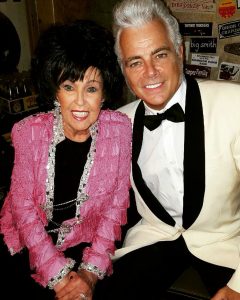 “It was pretty much a no brainer, giving her the award,” Watson says. “She’s the lady founder of rockabilly music. So, it was an easy decision. Even today, she’s still out doing the music, keeping it going.”
“It was pretty much a no brainer, giving her the award,” Watson says. “She’s the lady founder of rockabilly music. So, it was an easy decision. Even today, she’s still out doing the music, keeping it going.”
Though the music Jackson was performing was called rockabilly, she hated the term. It was the opposite of who she was as both an artist and a person. From the inception of her career, she didn’t follow the convention of how a woman from the country should present herself. “I never did like the term ‘hillbilly,’” she says. “That’s what we were called when we sang country songs. When I think of ‘hillbilly,’ I think of a girl in a pinafore with straw in her mouth. I had decided to put some glamour into my way of dressing and be a bit sexy. But that’s where rockabilly came from.”
In her autobiography, Jackson recalls her first date at the age of 15, with Leonard Sipes, a country singer-songwriter who later became known as Tommy Collins. It was a Saturday. She spent the entire afternoon getting ready, picking out a pretty dress and curling her hair. She writes, “I imaged what it would be like when Leonard arrived. I visualized him opening the door to his nice car for me, like a proper gentleman.” But, when Sipes arrived, he was driving a pickup truck. It wasn’t what she was waiting for, her dream of a romantic outing. So, she pretended the pickup truck was a Cadillac. Jackson, even at that age, had glamour on her mind.
As she quickly evolved into a rockabilly singer, she brought swagger and edge to the songs she performed. She broke the mold for female artists, incorporating beauty and sophistication as part of her image, debunking the stereotype she was faced with. Former touring partner, Rosie Flores, who Jackson played with in the ’80s and ’90s, explains. “She’s such a sweet-talking lady. She’s very proper and demur to have dinner with, then she’s raunchy on stage. It’s like, ‘wow!’ But that’s why the kids have always loved her,” says Flores. “I just remember being backstage with her,” she continues. “We sat in front of a mirror and she showed me the best way to apply my lipstick when we were getting ready.”
In the beginning of her career, Jackson was developing a signature sound that was in contrast to her very feminine look. But at the time, she was still a young woman without much experience in the laying down vocals. In 1956, the 19-year-old pioneer came across an obstacle in the recording of “Hot Dog! That Made Him Mad,” by simply doing something anyone her age would do without thought.
“There was a spot in there where I should have growled, but I had just drank a glass of milk. Kim Nelson saw me drinking it. He said, ‘Put that down! You can’t sing when you drink milk.’ But then, when I recorded ‘Fujiyama Mama’ and ‘Let’s Have a Party,’ I was really able to sing with a growl. I thought the songs demanded that kind of an attitude.” It is hard to believe, that the petite and polite Jackson, could belt out such powerful, edgy songs.
“Hot Dog! That Made Him Mad” was one of the first songs Jackson recorded and sang at her shows. “That was popular with the girls. They liked it,” she says. “But it wasn’t a hit by any means. Then a song called ‘I Gotta Know’ came along and it had a little bit of country flavor, then it breaks into rock ‘n’ roll, then back to country, then back to rock ‘n’ roll. So that was really my transition.”
As a sign of the times, breaking out as an artist was difficult for Jackson. Like her male counterparts, she was at the hands of the D.J.s who were playing rock ‘n’ roll at the time. But since the D.J.s were men who already had a hard time accepting Elvis and Jerry Lee Lewis, it was an even bigger uphill battle for Jackson, because she was a woman. It was near impossible for her to get radio play and gain popularity.
“When I came out with rockabilly, they were not going to help a teenage girl singing this devilish music. They called it ‘music from Hell.’ So I didn’t get any help. I kept recording it because I desperately wanted a hit record in that field, because I enjoyed singing it so much. But it wasn’t until 1960 that I had a hit, when ‘Let’s Have a Party’ was pulled off an album.”
As music evolved over the years, Jackson lost her place in rock ‘n’ roll and went back to her country roots. Eventually, she didn’t even recognize rock music as what she’d played early on. Despite the fact that she was thought to have created demonic music as a young woman, she stood behind the material she chose, even after she turned into a devout Christian. “It didn’t change my opinion. I was pretty selective with the songs I did. I wanted them to be clean songs that were fun and that were simple. People could sing along with you.”
By the ’70s, Jackson shifted course and focused on songs that celebrated her beliefs. “I received Christ as my Lord and savior and he became the most important part of my life,” she says. “I wanted to tell people about it and the best way for me to do that was through music. I even got out of my contract with Capitol Records. I was that serious about it. I went with a gospel company. I didn’t ever mean to divorce country music. That wasn’t my plan. I just wanted to add gospel to it. But people in those days, they wanted to pigeonhole you. You were either country or gospel or you were rockabilly. I wanted to do all of it. Eventually, I was able to.”
In the early ’80s, Jackson played and record rockabilly material when revivalists sought her out. She regularly toured Scandinavia, England, and Germany during the decade. Now embracing her rock ‘n’ roll history, Jackson released the album Rockabilly Fever in 1984. For decades, she was unaware that anyone was interested in rockabilly music in the United States. But in 1995, guitar prodigy Rosie Flores contacted her and said she’d like to have her sing a couple of songs on Rockabilly Filly, an album she was recording at the time. From there, Jackson found her way back to her rockabilly roots again, thanks to Flores.
“We got so much excitement about us working together,” Jackson says. “People wanted to book us at their clubs. Rosie hired a special agent just to keep up with the requests for us to come in person and sing, so we wound up doing a five week tour all across America, from San Francisco to New York City. We zig-zagged across the country and I found all of these fans that were into rockabilly music, and all these venues I didn’t even know anything about. So Rosie reintroduced me to a younger generation of rockabilly fans. And I’ve been very grateful for that.”
“That was the first time she’d ever hit the road and done small clubs around the U.S. that catered to a new rockabilly audience that started in N.Y.C. and branched out to L.A.,” Flores says. “One of the first times she saw the crowd, it was like she was back in the 1950s. The girls had poodle skirts and the guys had slicked back hair. She said, ‘Wow! I had no idea this was still happening.’”
Years later, in 2011, at the age of 73, Jackson’s trailblazing cool factor was once again elevated and introduced to new generations, when she collaborated with Jack White on the album, The Party Ain’t Over, which reached no. 17 on the charts. White, as Flores did, showed Jackson her continued influence on rock ‘n’ roll. The album incorporates Jackson’s signature sound, mixed with the gritty electric guitar work White is known for. In forming the album, White had Jackson cover songs by Amy Winehouse, Kitty Wells, Eddie Cochran, Johnny Cash, Johnny Kidd & The Pirates and Bob Dylan, all bringing about an almost punk edge, which suits who she has always been as an artist.
“We were thinking about different artists to collaborate with at the time. A friend of ours that was sitting with us at a table said, ‘Well if you decide to do that, be sure you call Jack White, because I know he is a big fan of yours.’ So, that’s what got it all started. He was a delight to work with. He told me at the very beginning, ‘I’ve been a fan of yours since I was in high school. I don’t want to change the way you sing or the songs at all. I just want to give you fresh music and fresh sounds that you can be doing.’ That put me at ease, he wasn’t going to ask me to do something I wasn’t comfortable with. Jack just has proven to be a wonderful friend.”
A few years back, in an interview, Jackson stated that she would retire by the time she was 80. “I just picked out an arbitrary number at the time,” she explains. “I thought, ‘By the time I’m 80, I’ll be ready to retire.’ Wendell and I had such a wonderful life together. People can’t really imagine that. We worked side by side for 56 years. He booked me. He ran a one-man office and loved doing it. We got to travel all over the world together. I was happy because I got to sing. He was happy because he enjoyed the show business life. We were talking about retirement and he said, ‘Let’s try to do this a couple more years if our health holds up.’ Little did I know, that he’d be gone in a few months’ time. But I feel like now, this is what he wanted. As long as I’m physically able to and my voice holds up, I do want to work a couple of years.”
October 20, 2017, Jackson played at the Cadillac Club in Toronto, Canada. It was her 80th Birthday show. She performed two nights, to sold out crowds, proving that even at her age, she can still bring out the same attitude, swagger, edge and glamour that she had her entire life. It isn’t the typical perception of a grandmother, but when it comes to perception, Jackson has always broken the mold. At the age of 80, she is still, undeniably, the Queen of Cool. Wendell, looking out for her as she did for him, all those decades ago.
Courtney S. Lennon
Latest posts by Courtney S. Lennon (see all)
- Billy Joe Shaver: August 16,1939 – October 28, 2020 - November 2, 2020
- You Are About To Become Involved With Van Dyke Parks! - July 13, 2020
- The Hero of Texas Music History - July 23, 2019

